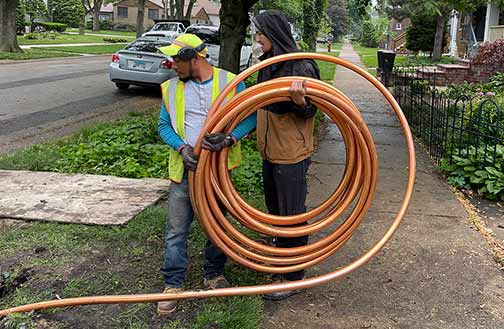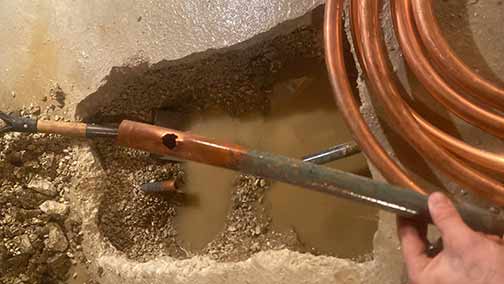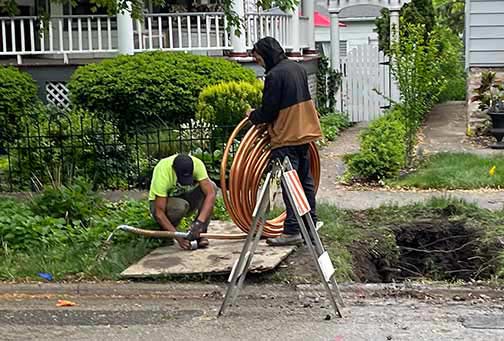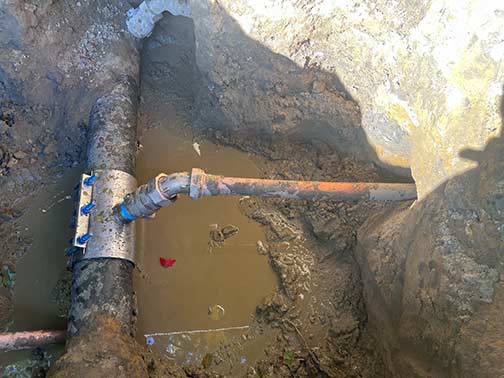Water line replacement and repairs are among the most complex and costly plumbing projects you can undertake in your Chicago home. When repairing or replacing your water line, Penny Realty Management warns that if the job is not done right, it can leave you with even bigger problems than you set out to solve.
Unfortunately for many homeowners in Chicago, water line problems are an issue they constantly have to deal with because of aging infrastructure. If your water line is leaking or your home’s water supply is contaminated, maybe it is time to overhaul the line.
But should you repair or replace the damaged water line? That depends on the water line issues you have in your home and how long the problems have been there. It also depends on the steps you have taken to solve past issues.
In this post, we explain the factors to consider before deciding whether to repair or replace a water line, along with the pros and cons of each option.
Water line repair versus replacement: 4 things to consider
The repair history of the water line
If the records show that your water line has had major problems in the past, there is a chance that it has also been repaired before. As a rule, you only want to repair a water line once. After the first repair, subsequent efforts will cost more money and be less effective. The potential for worse damage increases with each repair. Fixing a water line that has been repaired in the past is not cost-effective.
Age of the water line
If the water line is about or past 50 years old, it makes no sense to repair it. That’s because once a water line goes beyond this threshold, its functionality starts declining rapidly. Older water lines are more brittle, and minor problems with the pipes can easily escalate into major emergencies. Replace your water line if it is close to 50 years. Repair it if it is only 25 years old.
The water line materials
The type of pipes in your water line plays a huge role in your decision to repair or replace the line. If the line is made of lead pipes, replacing the water line is your best option, regardless of the age or condition. Some states and cities even make it illegal to fix lead pipes. In some locations, the only materials legally allowed for main water lines are brass, copper and ductile iron pipes.
The project cost
If the cost of repairing your water line is almost the same as the cost of replacing it, it makes sense to repair the line. As a rule, you want your repair costs to be at least 50%+ lower than your replacement cost. Otherwise, it is better to replace the line. This cost should include the material and labor costs for the entire project.

Replacing your water line is a long-term solution. For the next decade, at least, you should not expect any issues with the line.
Pros and cons of repairing your water line
Pros
- Cost-effective: It will always cost less to repair your damaged water line than it costs to replace it.
- Less disruptive: The impact on your time, lifestyle and landscaping is minimal if you elect to repair the line.
- Smaller environmental impact: The volume of waste generated by the repair process is minimal. The impact on the environment is also minor.
Cons
- Temporary: Repairing the water line is not a long-term fix because the problems may return
- Potential for future problems: Repairing a water line can predispose it to future problems.
- Not always an option: If the water line is badly damaged, repairing it may not even be an option.
Pros and cons of replacing your water line
Pros
- Long-term solution: Replacing your water line is a long-term solution. For the next decade, at least, you should not expect any issues with the line.
- Improved performance: Replacing your water line is the best way to deal with all the performance issues plaguing the line.
- Boost your property value: A new water line is something buyers want to see and are happy to pay more money for.
Cons
- Costs more money: It costs significantly more money to replace a water line to repair it. Funding the project can be a major challenge.
- Highly disruptive: Water line replacement involves a lot of excavation. That will often result in damage to your landscaping, driveway and paved walkways.
To conclude, replacing your water line when the issue can be solved by repairing the line is a waste of money. At the same time, repairing a water line when it should be replaced will force you to spend twice to solve the same problems.
To ensure you choose the right solution for your water line problems, it is vital to have a qualified and experienced professional plumber evaluate the damage to your water line and recommend the most cost-effective solution to the problem.


